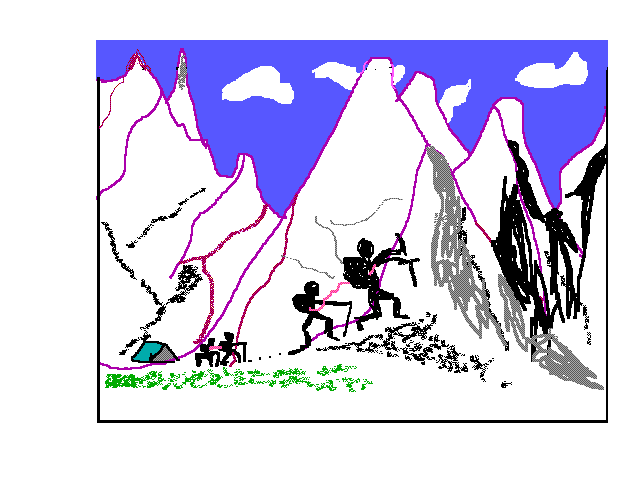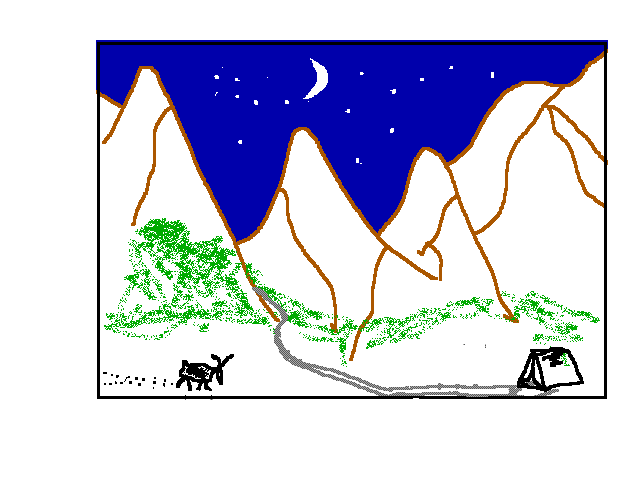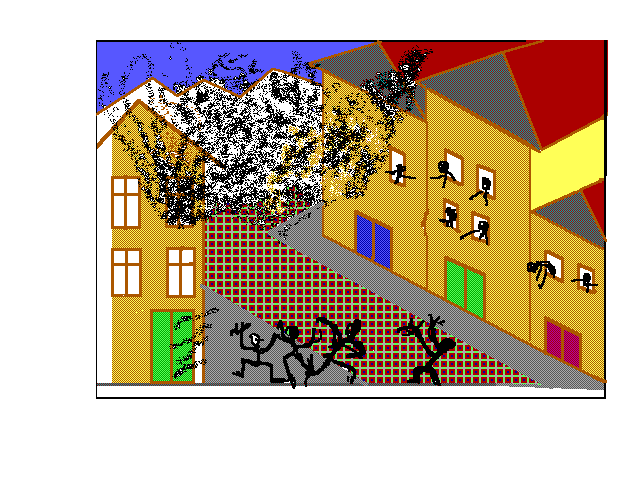
THREE VERY SHORT STORIES
By Mark Perakh
THE SOCKS THAT STOOD ON THEIR OWN

Our dreams had come true. Late in the evening we received finally the long coveted permission to climb the giant rock of Uzhba, The Caucasian Matterhorn.
The manager of our mountaineering camp said, "Not tonight, pals. The stockroom is closed for the day, the storekeeper went to sleep. So, go to the mess hall, have a good supper, and sleep well. Morning is smarter than evening, isn't it?'
We would not wait even for one hour. Uzhba was the focus of our dreams for too long. We promised the manager a bottle of vodka. The appeal of vodka was too strong, so he reluctantly filled out a form that listed the food items we were allocated for our climb.
The storekeeper was snoring in his cubicle. The promise of the same universal currency -- a bottle of vodka -- had brought him to life. Rubbing his eyes, he unlocked the storeroom, and moving his finger over the list of food items, placed on the countertop bread, matches, salt, canned fish, tea.... His finger stopped.
"What the hell is that?" he muttered.
"Can't you read? It says condensed milk," I said.
"Does it? Look here," he said. "It says two kilos of condensed milk, see?"
"Yes, so deliver it, and go to sleep."
"I have no two-kilo cans, only three-kilo cans of condensed milk."
We rushed to the camp's manager, to change the order from two to three kilos of condensed milk. His door was locked from inside. All our knocks and shouts remained in vain, he was dead asleep.
We had only one choice. We drilled a hole in a three-kilo can, and poured out one third of the sticky sweet mass of the condensed milk into a pan. Then we flipped a coin, who should carry the can with a hole in it, in his backpack. I guessed heads, it showed tails.
The storerkeeper handed over to me a swatch of cloth which I tucked into the can's hole. Then I wrapped the can in a few more rags and squeezed it into my rucksack, among my spare sweater, shirts, and thick woolen socks.
On the way to Uzhba, my rucksack, whose bottom rested in the small of my back, rolled gently from side to side on my spine, as my feet slipped on the silty curved path.
A pinkish strip emerged above the serrated contour of the ice-clad peaks when we had reached a place named Bear Meadow. Right here started to rise the steep slope covered by neve, hardened snow, that led to the giant black wall of Uzhba.
Here we would leave two rookies to watch the progress of our climb through binoculars.
Before starting the climb, we had to rearrange our rucksacks. I pulled the can from my rucksack. The rugs that I wrapped it with, felt sticky. I licked my finger and it tasted sweet. I pulled my sweater from my rucksack. When I dropped it, the sweater, rather than limply folding, descended slowly to the ground, as if some force tried to keep it vertical.
Then I fetched my socks. I put them on the ground, and the thick woolen creatures remained standing.
In the gray twilight of the fledfing dawn, the pair of thick woolen socks stood on their own.
Then echo of the rookies' and my partners' loud laughter rolled through the dark gorges.
I did not laugh. I did not see anything funny around.
Two days later, exhausted by the fight with Uzhba's rocky slopes, we came back to the Bear Meadow, accepting the congratulations by the rookies, and thirsty beyond description. Every mountain climber is familiar with that insatiable thirst after a hard work on rocks or ice. It was around midnight.
We flipped the coin. I guessed tails, it showed heads. I had to prepare tea, the last for that outing, while my partners stretched out on the ground.
I set up a campfire and hung a pail of water from a makeshift tripod.
The tea was ready, and we squatted around the fire. I poured the hot tea into five mugs.
"You've made it perfect," one of my partners said. "Hot and sweet. Like in paradise. Why don't you drink it yourself?"
"I had plenty of it as I was brewing it," I said.
"May I have more?" my partner said.
"All of it!"
They drank all of it, and it still did not fully quench their thirst. Finally, one of them tilted the empty pail, to get the last drops of the so sweet tea.
The well cooked woolen socks slid from the pail into his mug.
As the rookies and my partners stared at the socks, I laughed. None of them laughed. Apparently they did not see anything funny around.
THE ROBBERY AT KLUKHOR PASS

On a cool September day, I and my fellow mountain climber Sergey set out on the two-day long trip from our camp to Sukhumi. That Abkhasian city, with its sunny beaches, lay behind the Caucasus range. On the eve of our departure, the camp manager said, "Two more imbeciles. Don't you know that sane people travel over Klukhor pass only in groups of at least twenty?"
Yes, we heard those stories of robberies and even murders that had occurred at or near Klukhor pass. The local villagers had piles of weapons hidden in their mountain fortresses-like domains. The weapons had been left behind, a few years earlier, by the retreating German troops. These mountain people, the Chircassians, kindred to Chechens, had learnead the values of photo cameras, watches, and mountaineering gear.
But nothing could stop us. After we had been freezing, during the three-month long season, on the snow-clad peaks, the appeal of the warm sea shore paradise was irresistible.
"If you stubbornly refuse to listen to reason, then sign this form that you go at your own risk."
We signed the form. We stuffed our rucksacks with bread, and cans of condensed milk, and with a tightly rolled up tent. And we had a weapon. It was a small hatchet. Normally we used it to chip wood for campfires.
The path from our camp to Klukhor first led us among the giant pines of the eternal Caucasian forest. Then we left the woods and saw cattle herds on the remote meadows. A few times, the path meandered close to pastures, and each time we watched strenuously the shepherds, expecting to discover concealed ponyards or firearms. But the bearded Chircassians only followed us with indifferent eyes, and sometimes even waved in a friendly manner.
The dazzling white peaks of the Dombai mountain range surrounded us from all sides. Close to Klukhor pass, we skirted a bumpy glacier, its cold breath wafting into our faces.
The first stars pierced the rapidly darkening sky when we had erected our tent and crawled into our sleeping bags.
Sergey laid the hatchet at his elbow. We were camping in the area where, as the stories went, most of the robberies and disappearances of travelers had occurred.
The sound of footfalls woke me up. Somebody was approaching our tent.
My heart pounded. I knew Sergey had clenched the hatchet, ready for fight.
The footfalls sounded now right at the tent, where our heads almost touched each other. We heard small stones rolling down the slope from under somebody's feet.
Suddenly something sharp, like a knife, struck the taut flap of our tent, and a swift motion cut the fabric from the bottom up.
I grabbed Sergey's arm. "What are you waiting for?" I shouted. The hatchet whistled, inflicting a powerfull blow upon the invisible hand hodling the invisible knife.
A terrifying wail tore up the night's stillness, and echoed in remote canyons.
We leapt out of the tent. Sergey flicked his flashlight, and we saw a goat with a half-severed horn.
THE SMOKE WITHOUT FIRE

Our apartment in Novosibirsk, the main city of Siberia, had two rooms and a kitchen. It was inhabited by seven people and two million three hudred thousand eight hundred twenty seven cockroaches.
If one placed a bowl of soup on the kitchen table, a few cockroaches would dive into it from the ceiling at once. The insects swarmed in every crevice and crack.
One day my wife let me know that she had enough of it. It had to be either her or cockroaches.
In a chemical shop, an elderly sage of an attendant handed to me a quart-size can with the picture of a roach.
Following the instructions, I closed the windows, placed the can on the kitchen floor, and shoved a burning match into the opening.
Rather than going aflame, the tar-like mass smoldered, a faint smoke wafting out gingerly.
We shook our heads skeptically. We knew our cockroaches. Even the strongest foul-smelling fumination we had tried before, whose stench drove us out of the apartment, only seemed to improve the health and the appetite of our cockroaches. This gentle smoke would surely have no effect whatsoever.
But the can had been paid for, so we decided to wait in the street for some ten or twenty minutes and then come back to our cockroaches. So we all walked out.
"Look! Fire! " a passer-by shouted pointing at our kitchen window. It happened some ten minutes after we had left the apartment.
Dense black and blue smoke seeped through the window's chinks. It expanded rapidly, the dark cloud spreading in all directions.
A man darted from the building. He was cursing, spitting, coughing, all at the same time. Then another man followed, then two more, three, five...
The tenants from all twelve apartments on all four floors dashed out, one after one, swearing and rubbing their eyes.
Two men hurriedly carried out an old woman on a stretcher.
I rushed to the building. The stairway was full of the dark, choking smoke. Coughing, I scurried out.
"We must open the windows, or it will destroy our apartment," my wife said.
"Yes, if i had a gas mask..."
"Milk!" some self-appointed expert shouted from the crowd. "If you pour milk on a kerchief, and cover your nose and mouth..."
I ran to the milk store a block away. A long line snaked there toward the counter.
Hurriedly, I begged the people in the line to let me buy a bottle of milk ahead of them. The weathered buyers had seen all and every trick a smartass might invent to get to the head of a queu. They wouldn't fall for such a cheap ruse as a story about cockroaches and fumes.
I ran back. The entire block was now enveloped in the black smoke. Its eddies twisted about invisible axes which seemed to extend from our windows.
I wettened a kerchief from a hydrant, placed it over my nose and mouth, and dove into the stairway. Trying not to breath, I ran up the stairs, jerked open the door, fell toward the window and kicked it open.
When I was back in the street, my throat and chest burned and black tears obscured my vision.
With the window open, the egress of fumes accelerated.
The flow of smoke started to dwindle, when a fire engine roared from behind a corner. A ladder grew toward our window, and a fireman with an axe in hand, climbed rapidly, prepared to break in.
I had a hard time until I managed to convince the firemen that, contrary to the adage, this was a case of smoke without fire...
When we came back to our place, all two million three hundred thousand etc, of dead cockroaches, strew all over the floors and furniture. A thick layer of ashes lay on the tables, chairs, and beds.
The empty can sat innocently where I had left it.
I picked it up. Now I noticed a fine print warning, "For outdoor use only - gardens and fields."
As far as I know, there are no more insects in the entire block in the center of Novosibirsk where I once used to live.
(Please use the BACK button on your browser to return to the "contents"page).